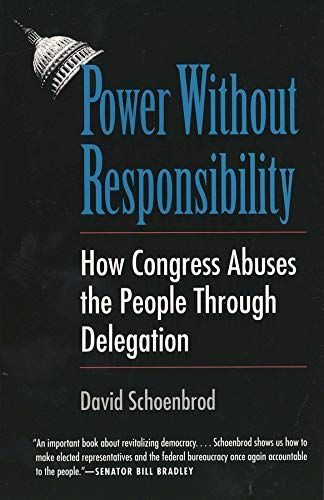
Power Without Responsibility How Congress Abuses the People through Delegation
This book argues that Congress's process for making law is as corrosive to the nation as unchecked deficit spending. David Schoenbrod shows that Congress and the president, instead of making the laws that govern us, generally give bureaucrats the power to make laws through agency regulations. Our elected "lawmakers" then take credit for proclaiming popular but inconsistent statutory goals and later blame the inevitable burdens and disappointments on the unelected bureaucrats. The 1970 Clean Air Act, for example, gave the Environmental Protection Agency the impossible task of making law that would satisfy both industry and environmentalists. Delegation allows Congress and the president to wield power by pressuring agency lawmakers in private, but shed responsibility by avoiding the need to personally support or oppose the laws, as they must in enacting laws themselves. Schoenbrod draws on his experience as an attorney with the Natural Resources Defense Council and on studies of how delegation actually works to show that this practice produces a regulatory system so cumbersome that it cannot provide the protection that people need, so large that it needlessly stifles the economy, and so complex that it keeps the voters from knowing whom to hold accountable for the consequences. Contending that delegation is unnecessary and unconstitutional, Schoenbrod has written the first book that shows how, as a practical matter, delegation can be stopped.